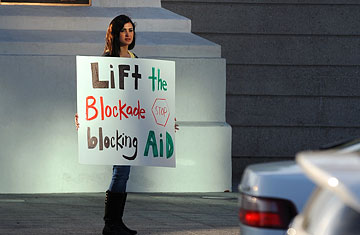
A protester holds a sign criticizing the Israeli blockade of Gaza outside the Federal Building in Los Angeles on June 2, 2010
Israel's raid on the Gaza aid flotilla on May 31 initially appeared to many as an unmitigated disaster for the Obama Administration, for three reasons: First, the U.S. would have to protect Israel against a furious diplomatic backlash from other countries, potentially damaging U.S.-led alliances at NATO and the U.N. Second, it would undermine the U.S.-led peace process by inflaming Palestinian anger at Israel, creating a pretext for the Palestinian side to derail the fragile, indirect negotiations they agreed to with great skepticism. Third, it would hurt U.S. efforts to get new sanctions against Iran passed by the U.N. Security Council because Turkey, whose government had tacitly encouraged the flotilla and which lost four of its nationals in the violence that followed Israel's attempt to commandeer one of the vessels, holds one of the rotating seats on the Council.
So far, however, U.S. officials say none of those fears has materialized. To be sure, Israeli-Turkish relations are in a real crisis, which the U.S. isn't excited about. And the fiasco has again reminded President Obama that he has a difficult partner in Israeli Prime Minister Benjamin Netanyahu. But the U.S. appears to have navigated the episode with minimal damage to several important interests, while doing what it can to manage fallout further afield.
Obama spoke with Netanyahu three times on May 31 in the wake of the raid. The first conversation was initiated by Netanyahu, who called the President in Chicago to tell Obama he was returning to Israel to deal with the crisis, meaning he would not be coming to Washington on June 2 for a planned meeting at the White House, according to a senior White House official. The Administration has declined to reveal details of the subsequent conversations, but at least one of them included discussion of the Israeli dispatch of Uzi Arad, Netanyahu's national security adviser, to Washington for talks with his U.S. counterpart, General Jim Jones. At the top of the agenda was the Gaza incident.
At first it looked as if the diplomatic damage might be considerable. As Europe criticized Israel, there was talk of confrontation at the U.N., and some in Turkey even raised the specter of demanding a NATO response to the Israeli raid. Washington, in response, released a measured statement regretting the loss of life in the incident and calling on Israel to thoroughly investigate it. The idea, Administration officials say, was to buy time for the crisis to abate, for Israel to get an investigation up and running, preferably a credible one, and to do what could be done to placate the furious Turkish government.
Four days after the fiasco, the plan seems to be working. The U.S. hosted Turkish Foreign Minister Ahmet Davutoglu, listening to his concerns at length and pressuring Israel to respond to them. The U.S. urged Arad and the Israelis to release the hundreds of detained activists from the ships, and Israel has largely complied. Minimizing the Turkish-Israeli fallout, says a senior White House official, "has been the focus of our effort from the moment we learned about this."
The Israeli-Palestinian peace process, limited as it is, continues. The Palestinians have not walked away from the table, the Arab countries have not called for them to do so, and Obama's envoy to the region, former Senator George Mitchell, will travel to the region this weekend to continue talks. No one expects much from the conversation, although some would see the fact that it has not collapsed in the wake of the Gaza incident as a positive sign.
The Iran sanctions effort at the U.N. "was not helped" by the Gaza incident, says a senior European diplomat. But European and U.S. officials insist the incident has not slowed the process of rounding up votes. The U.S. maintains support from the five permanent members and still hopes to get as many as 14 total votes for sanctions by mid-June. With Lebanon likely to vote against sanctions because of the influence of Hizballah in its government, that would mean getting Brazil and Turkey on board — which would require them to reverse their recently restated opposition to new sanctions in light of the uranium-swap deal they brokered with Iran, which has been largely ignored by the U.S. and its allies. But the Gaza events don't appear to have affected the equation.
As for international penalties against Israel, the U.S. believes a credible Israeli investigation can relieve pressure for other action at the U.N. or elsewhere. That is the most difficult part of the process, since few countries other than the U.S. are likely to be satisfied with an Israeli probe of its own conduct. "When the Israelis describe how they will conduct the investigation," says a senior White House official, "that will be the moment" of truth.
